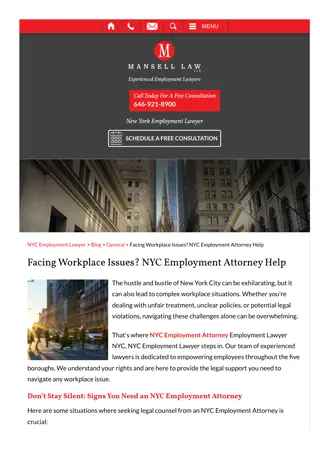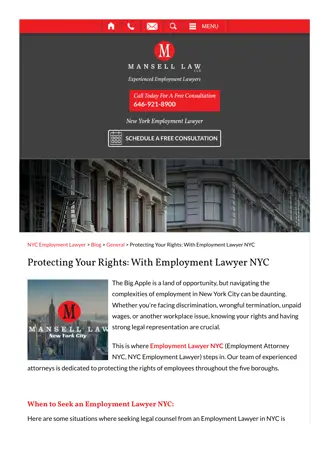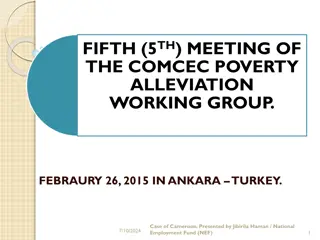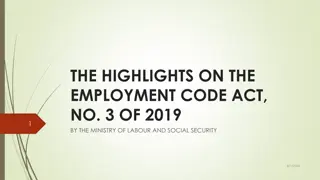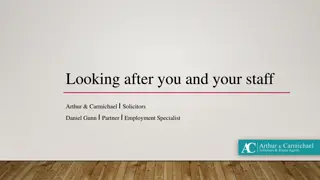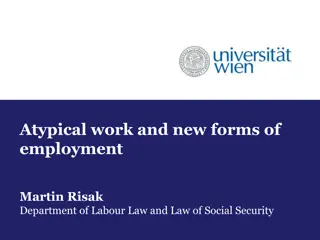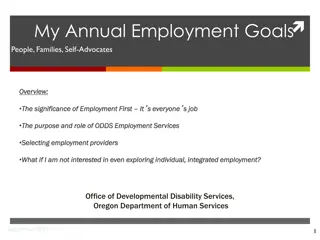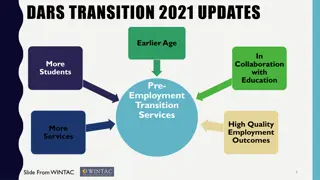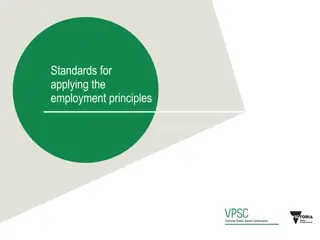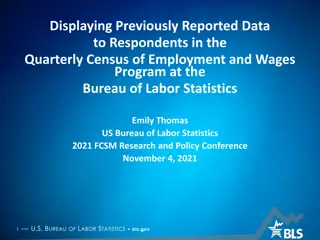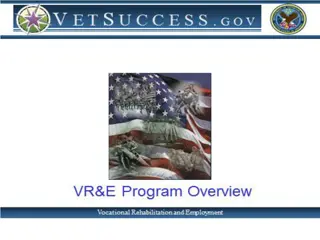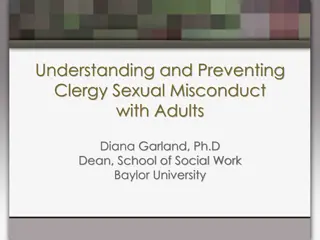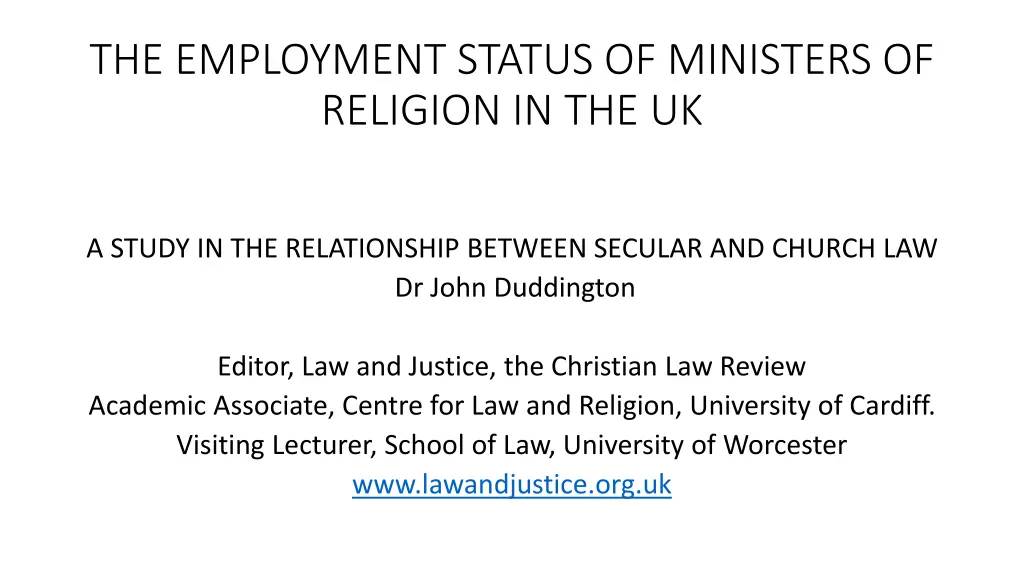
Employment Status of Ministers of Religion in the UK: A Study in Secular and Church Law
Explore the unique employment status of clergy members in the UK, analyzing the relationship between secular law and church regulations. Delve into court cases, such as Rogers v. Booth, to understand the complex legal considerations surrounding clergy employment rights. The discussion raises questions about the lack of traditional employment rights for clergy, and whether alternative arrangements could be beneficial.
Download Presentation

Please find below an Image/Link to download the presentation.
The content on the website is provided AS IS for your information and personal use only. It may not be sold, licensed, or shared on other websites without obtaining consent from the author. If you encounter any issues during the download, it is possible that the publisher has removed the file from their server.
You are allowed to download the files provided on this website for personal or commercial use, subject to the condition that they are used lawfully. All files are the property of their respective owners.
The content on the website is provided AS IS for your information and personal use only. It may not be sold, licensed, or shared on other websites without obtaining consent from the author.
E N D
Presentation Transcript
THE EMPLOYMENT STATUS OF MINISTERS OF RELIGION IN THE UK A STUDY IN THE RELATIONSHIP BETWEEN SECULAR AND CHURCH LAW Dr John Duddington Editor, Law and Justice, the Christian Law Review Academic Associate, Centre for Law and Religion, University of Cardiff. Visiting Lecturer, School of Law, University of Worcester www.lawandjustice.org.uk
Three questions: Why do the clergy in general not have employment rights like most other people? Does it matter? Is there an alternative?
Rogers v Booth (1937) 2 All ER 751 Salvation Army Officer fell over a coal bucket whilst working at the Salvation Army Hall in Minster, Kent. Her elbow was injured and afterwards she suffered from a nervous debility. Claimed compensation under the Workmen s Compensation Act, 1925 for her injury. S.3(1) of which defines a workman as one who works under a contract of service.
The reasoning of the court The Court of Appeal subjected the constitutional documents of the Salvation Army to detailed analysis together with the forms used when officers were appointed. It did not find that these helped the contention that there was a contract of employment e.g. The Orders and Regulations for Officers of the Salvation Army stated (at II.I) that The Salvationist, having accepted the principle of leadership and placed himself under the guidance of those whom he believes to his leaders by divine appointment, should render to those leaders a constant and cheerful obedience. He should take his instructions as from God, and obey them without controversy or complaint . These and other documents went to great lengths to make it clear that the arrangement was voluntary.
Result. No contract no status of a workman no compensation. Note: Today a Salvation Army website (www.salvationarmy.org.uk/updated- statement-officers-pay says: When men and women make a commitment to Salvation Army Officership they make a covenant with God. They receive financial remuneration (on average between 9,500 and 15,500) to cover their cost of living and a home is provided by way of officer s quarters . Contract?? Note two general difficulties in clergy employment cases: (a) Often no contract (b) Even if there is the courts are often reluctant to hold that the clergy have employment status
In some cases there is a contract Clergy who are school, hospital, prison etc. chaplains will often have a contract with the school etc. but this will not mean that they have a contract with their church. In a few cases courts have held that there is a contract with the church: New Testament Church of God v Stewart (2007) IRLR 178 The Church had removed the applicant him from his church after financial irregularities had been found after an audit. He claimed that he had been unfairly dismissed. The EAT held that ministers of religion can have the status of employees and so can claim for unfair dismissal and the full range of employment rights.
Reasoning of the court He was paid. There was detailed control over ministers of the Church, they were expected to report regularly to the national office and his salary was paid from that office. Standards which were expected of a minister and guidelines as to what a minister was expected to do were clearly set out. Most other cases have gone the other way why? No guaranteed right to payment no contract but this does not explain everything.
Reluctance of the courts to find employee status why? Clergy have a spiritual relationship not an employment one. What does this mean? As Edge says: the term has been used without any clear explanation of its meaning, which has contributed to the 21st-century scepticism over a distinction between spiritual and other services . (Ox. J Law Religion (2015) Gillian Evans points out the: tendency to assume in this group of cases that spirituality is a single defining quality common to all relationships between ministers of religion and the religious bodies they serve, and that therefore any incompatibility with a contractual relationship is everywhere the same (Discipline and Justice in the Church of England ( Gracewing, 1998)
Is it that the clergy have a vocation? Lady Hale in Preston v President of the Methodist Conference (2013) [2013] UKSC 29 The nature of many professionals' duties these days is such that they must serve higher principles and values than those determined by their employers. But usually there is no conflict between them, because their employers have engaged them in order that they should serve those very principles and values. I find it difficult to discern any difference in principle between the duties of the clergy appointed to minister to our spiritual needs, of the doctors appointed to minister to our bodily needs, and of the judges appointed to administer the law, in this respect .
Is this right? Although on the surface this may seem perfectly reasonable Julian Rivers in The Law of Organised Religions argues that it misses the point: the spiritual nature of the ministry as one of vocation: the complete and lifelong call of God to exercise ministry in the church in contrast to the element of reciprocity present in commercial contracts.
Different approaches in different churches each church has a distinct ecclesiology. Note this statement by Cardinal Vincent Nichols, the present RC Archbishop of Westminster, who wrote of the relationship which existed between one of his predecessors, Cardinal Basil Hume and his priests: When priests in his care got into difficulties, they turned to him for support and acceptance. Many found support in his compassion. He never turned any away. Their burdens became his, for he recognised that bond between bishop and priest as being like father and son. Essay on Basil Hume in English Catholic Heroes Gracewing, (2008) 250.
Courts must take account of this: Rule of Self Description Paul Goodliff, Baptist Church Polity and Practice (2012) 168 Law and Justice 15: .. the employment status of Baptist ministers remains that of office- holder .Baptists, having argued that the final place where the mind of Christ is discerned is the Church Meeting, are loathe to forgo this theological principle of the rule of Christ, and grant to an Employment Tribunal the final court of decision. Indeed, for the State to encroach upon this sphere of church polity not only contradicts Baptist self- understanding, but may also contravene the rights to religious freedom enshrined in human rights legislation, (Article 9 of the European Convention on Human Rights.)
Where are we now? Clergy are generally office holders no employment protection rights. Vague status in law. May be employees May be workers but not employees so can claim rights under discrimination law, protection of whistleblowers etc. Not satisfactory
Sharpe v Worcester Diocesan Board of Finance Ltd. and the Bishop of Worcester (2015) EWCA Civ. 399 Preliminary issue was Mr. Sharpe s employment status and so the facts were not in issue. He had alleged that his relationship with the local community broke down and he then resigned, accusing the Church of failing to support him. He claimed that his dog had been poisoned, his telephone lines cut and his tyres slashed because he was considered an outsider . He claimed that: (a) he had suffered detrimental treatment, as a result of making protected disclosures, which involved worker status (b) he was then constructively and unfairly dismissed involving employee status.
The decision Could a contract be implied? Arden LJ held that there could not be any space for a secular employment contract because the whole relationship between the parties was governed by church law. Lack of control by the bishop: oath of obedience taken by priests to him did not amount to much. Arden LJ The powers of the bishop in relation to appointment are slight. The powers of the bishop to control what an incumbent does are exiguous. The result was that the claimant s submission that the oath of canonical obedience represents the highest degree of control by the bishop was rejected.
The result Arden LJ was impressed with the respondent s argument that as the terms of the appellant s appointment were determined by church law, except for the remuneration package, there was no room for any negotiation and so no room for a contract. Result: not an employee or a worker Newspaper headline: Vicars employed by God not the Church says court in landmark ruling . Note: Two obvious differences between the concept of obedience in Church of England Canon Law and the implied duty in the law of contract: the first is that it does not rest on contract and thereby on agreement and the second is that it is imposed by an oath.
A solution? New scheme Clergy not employees But shall have rights similar to those of employees if their church decides to opt in to the scheme. Scheme will provide for effective grievance procedures and a procedure for dealing with complaints by the clergy that they are victims of bullying or harassment. In addition all clergy shall have protection under Discrimination Law and Health and Safety Law

